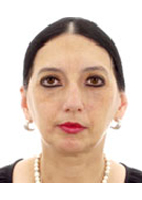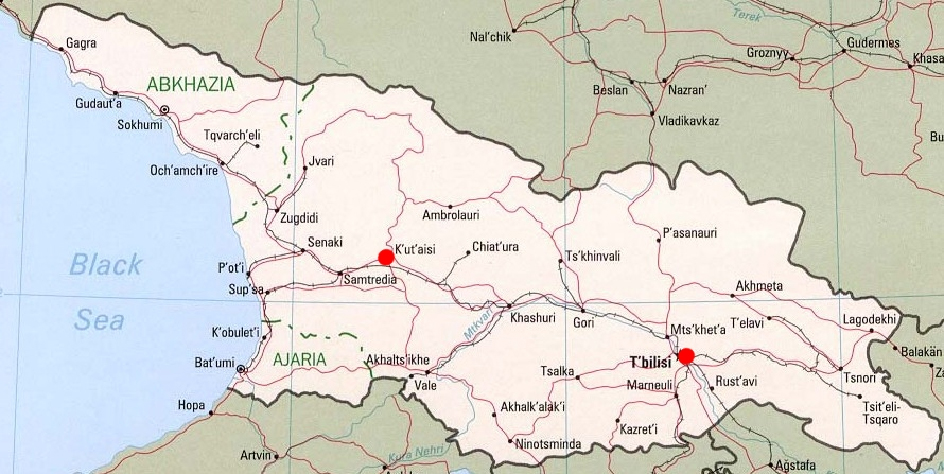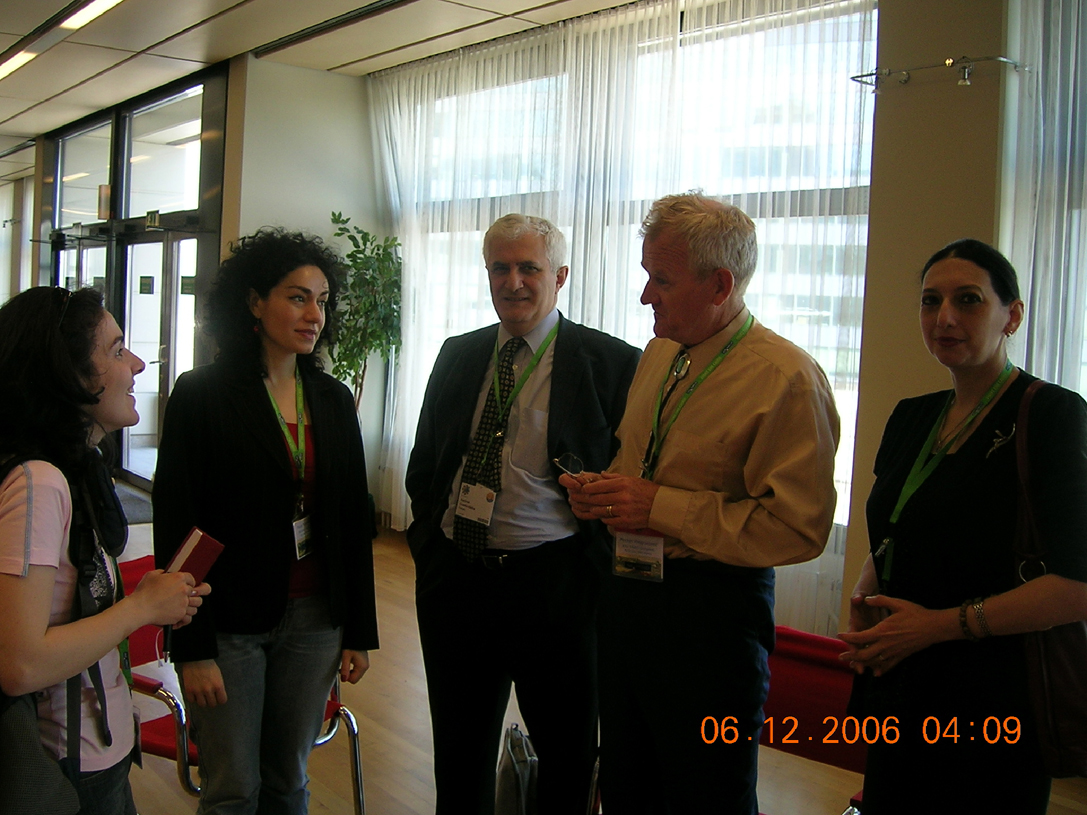

Georgia
National Publications
The following publications used ISAAC data from Georgia:
- Abramidze T, Gotua M, Rukhadze M, Gamkrelidze A. ISAAC I and III in Georgia: time trends in prevalence of asthma and allergies. Georgian Med News.2006 Aug;(137):80-2.
- Abramidze T, Gotua M, Rukhadze M, Gamkrelidze A. Prevalence of asthma and allergies among adolescents in Georgia: comparison between two surveys. Georgian Med News.2007 Mar;(144):38-41.
Georgia, Northern and Eastern Europe
| Centres: | Phase: | PI: | Age Groups |
|---|---|---|---|
| Kutaisi | 1 | Dr Nino Khetsuriani | 13-14, 6-7 |
| Tbilisi | 1 | Professor Amiran Gamkrelidze | 13-14, 6-7 |
| Tbilisi | 2 | Dr Maia Gotua | 10-11 years |
| Kutaisi | 3 | Dr Maia Gotua | 13-14, 6-7 |
National Coordinator:
Roles:
- National Coordinator for Georgia
- Phase Two Principal Investigator for Tbilisi
- Phase Three Principal Investigator for Kutaisi
Dr Maia Gotua

Director
Center of Allergy & Immunology
2/6 Lubliana str.
Tbilisi
Georgia
Background
Georgia, which former was one of the Soviet Union countries, gained its independence in 1990 and faced most complicated political situations and hard economic conditions. Despite the mentioned Georgia was always opened to new researches, including epidemiological studies. The ISAAC regional coordinator for Northern and Eastern Europe professor Bengt Bjorksten kindly invited Georgia to participate in ISAAC study in 1994. This participation was defined according to the following key points: the lack of any epidemiological data regarding markers of allergy diseases for that time in Georgia; the interest to confirm the purpose that the prevalence of these diseases in Georgia should be much lower than in country with market economy (as it was revealed in the other less industrialized formerly socialist countries); as well as personal contact with Prof. Gamkrelidze and his team of highly-qualified allergologists at the Tbilisi State Medical University and later staff of Center of Allergy and Immunology.
Impact of ISAAC
Involvement in a large global research project gave chance of new research, education and obtaining of practical experience to our country. It was extremely important for developing allergy and epidemiology fields in Georgia and learning new approaches of standardized high quality research. Participation in ISAAC expanded our professional contacts and was good opportunity for active exchanging of scientific knowledge with our colleagues in other countries.
Findings
ISAAC Phase I and as well as ISAAC Phase III were conducted in two cities of Georgia – Tbilisi and Kutaisi, characterized by different geographical and urban peculiarities. The prevalence of symptoms of allergic diseases in Georgia according to the results of ISAAC I survey mostly was less than 5%. The exception was the prevalence of wheezing 12 months among 6-7 yrs. Old children (Kutaisi – 9.3%, Tbilisi -5.4%), which possibly could be less related to allergy and more associated with infections in the younger children. The regional differences (between two study centers) in symptoms were not obvious among 13-14 yrs. Old children. The 12 month prevalence of wheezing and conjunctivitis were slightly higher in Kutaisi than in Tbilisi among the 6-7 yr olds children.
ISAAC Phase II was performed in Tbilisi, in 2001-2002. The prevalence rate of asthma became 9.2%, the prevalence rate of 12 months of itchy rash and flexural dermatitis were 7.6% and 5.9%, respectively, which was higher than the prevalence of eczema symptoms reported in Georgia 6-7 years ago (ISAAC Phase I – 1995-1996). The prevalence of current rhinoconjunctivitis was increased as well (6.3% vs. 4.7%). An interesting finding was that the family history of allergic diseases and damp spots on the wall was the main determinants for all types of allergic symptoms as well as high co-morbidity of allergic diseases. ISAAC Phase III was conducted in May 2003 – December 2003 in two centers. Unfortunately, Tbilisi center was excluded from the global data analysis. That was caused by very low response rate (46% - 13/14 yrs old group, 56% - 6/7 yrs old group) during the fieldwork period, due to the difficult political situation inside the country (so-called “Rose Revolution" located in Tbilisi). In order to reveal tendency of changes of allergic symptoms prevalence in our country we analyzed both centers. The results of ISAAC phase III study indicate that the epidemiological features of asthma and allergies in Georgia are changing, although the causes are still uncertain. Considerable geographic variation in time trends of prevalence of symptoms of asthma and allergies can been seen in both age groups (6/7 and 13/14 yrs old). The prevalence changes, particularly the increasing pattern, more clearly expressed in Tbilisi than in Kutaisi centre. Among adolescences in Kutaisi center only “current wheezing” increased from 1996 (3,6% (95%CI 3.1-4.1)) to 2003 (5.1% (95%CI 4.3-5.9)), the prevalence of all other allergic diseases decreased or remained without changes. It should be noted, that the prevalence of current wheezing among 6-7 yrs old children, in contrast to other age group, decreased by 2,4% (9,3% (1996) and 6,9% (2003)), the symptoms of current rhino-conjunctivitis slightly decreased and symptoms of flexural dermatitis reduced by 2.8% (p < 0.01).References
- Björkstén B, Dumitrascu D, Foucard T, Khetsuriani N, Khaitov R, Leja M, Lis G, Pekkanen J, Priftanji A, Riikjärv MA. Prevalence of childhood asthma, rhinitis and eczema in Scandinavia and Eastern Europe. Eur Respir J. 1998 Aug; 12(2):432-7.
- Weinmayr G, Weiland SK, Björkstén B, Brunekreef B, Büchele G, Cookson WO, Garcia-Marcos L, Gotua M, Gratziou C, van Hage M, von Mutius E, Riikjärv MA, Rzehak P, Stein RT, Strachan DP, Tsanakas J, Wickens K, Wong GW; ISAAC Phase Two Study Group. Atopic sensitization and the international variation of asthma symptom prevalence in children. Am J Respir Crit Care Med. 2007 Sep 15; 176(6):565-74. Epub 2007 Jun 15.
- Abramidze T, Gotua M, Rukhadze M, Gamkrelidze A. Prevalence of asthma and allergies among adolescences in Georgia: comparison between two surveys. Georgian Med News. 2007 Mar ;( 144):38-41
Acknowledgment
We wish to thank Prof. Bengt Bjorksten for a supervision and great support in carrying out of all phases of ISAAC study in Georgia. Many thanks to ISAAC group of University of Ulm under the leadership of Prof. Stephan Weiland and ISAAC group in Auckland for supporting in data entry and analysis. We are also grateful to all the children, parents and school staff who participated in the surveys.





